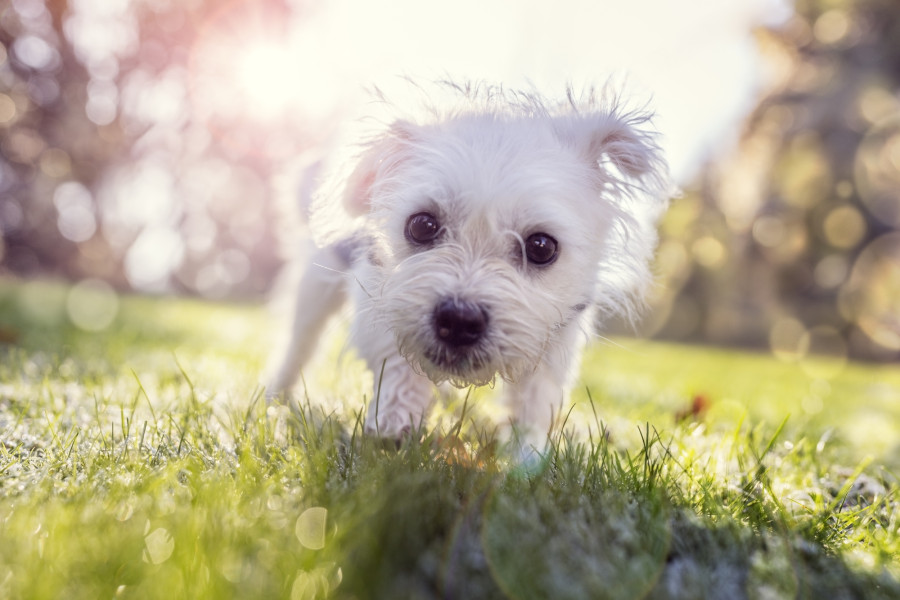Is the Maltese the Right Dog for You?

While many do not consider themselves “little dog people,” there are few who can look at the Maltese without smiling. This petite dog is known for being “perfectly proportionate” with large dark eyes and a gumdrop black nose that captures hearts. Long silky white hair that is hypoallergenic adds to the attraction. But is this adorable dog that is small on stature but large in personality the right dog for your family? Read on to find out.
Breed History
The Maltese is one of the world’s oldest breeds! While there is some debate just exactly how old, the breed is ancient—Darwin even theorized as old as 6,000 B.C.—while others say 2-3,000 B.C. The island of Malta has been occupied throughout history by various conquerors – and every single one of them fell for the cute lap dog. It was known as a royal dog – Roman emperors and their ladies had them, as did Mary Queen of Scots, Queen Elizabeth 1, and Marie Antoinette, to name just a few. The Greeks made tombs for them and they were often included in their epic poetry. Everywhere the breed went, it gained popularity. Over the years it also had many names by the different people that cared for them, including “Ye Ancient Dogge of Malta,” “Roman Ladies’ Dog,” “The Comfort Dog,” and more.
After the fall of Rome, Chinese breeders took up the breed, and mixed it with their native toys to get the breed we see today. At the first Westminster Dog Show in New York, in 1877, it was shown as the Maltese Lion Dog.
Today the breed is still popular the world over. Standing at under 25.5 cm to the top of the shoulder and weighing under 3.2 kg, they are still the small lap dog the Roman ladies would carry in their sleeves or bodices.
Temperament
Don’t be fooled by the idea that this adorable dog is just a pretty lap accessory. The Maltese have a lively temperament. They are brave but are alert-barkers when it comes to strangers and can be reserved towards them. They can be willful when it comes to training. Sometimes called the Maltese Terrier, they definitely have a terrier-like personality. This means they know how to get a human to do what they want – and do not always want to do what you ask. But they are wonderful companions having been closely interacting with humans for thousands of years, and love to play.
Energy Level
While lively, the Maltese can stay fit and mentally satisfied with a daily walk or romp in the backyard – even running around the house can provide enough exercise to keep this tiny dog fit, making them great for flats (as long as you can train them to not alert bark!)
Space Needed
Their small size makes them perfect for any size home – from a studio flat to a large house with a backyard. Know that this is not an outside dog – they were bred to be companions and want to be inside. (Plus, their white, silky hair would be a NIGHTMARE, if stuck outside in the dirt all day).
Common Health Problems
This ancient breed did not survive the centuries by being unhealthy. They are actually a very healthy breed. Breeders should screen for the following: luxating patella, heart anomalies like patent ductus arteriosus, congenital liver issues including liver shunt and microvascular dysplasia, and progressive retinal atrophy (PRA), an eye disease that causes blindness.
Like many small dogs, they can be prone to collapsed tracheas, so use a harness not a collar on your Maltese. They also can have dental issues, also like other small dogs, so routine dental care is important.
Grooming of their fine silky hair is probably one of the biggest health areas that cannot be ignored. They do need consistent grooming to keep it mat free. And of course, their white coat means they are prone to tear staining. Cleaning the eye area with a damp clothe daily helps, and so does giving your dog purified water to drink.
Finally, being small means that they can be injured easily. They are known jumpers, and a jump off a couch or other high place can be trouble for their tiny bones and ligaments. Having steps for them to use is the best way to help prevent injury.
Training
Maltese are lively, intelligent, and love interacting with people, but they can be willful when it comes to training. Since they can be alert barkers, proper socialization when young is important. They do best with reward-based training and, with consistency, can be trained to do many things – including dog sports! They do well at agility, rally, and obedience competitions.
Feeding Recommendation
We recommend you feed your Maltese puppy the Salmon, Turkey & Pork, switching to adult portions around eight months old.
If you are looking for a small dog that loves companionship (might not be the best choice if you are gone all the time!), don’t mind routine grooming including eye cleaning, and consistent training, then you and the Maltese can have a long and happy life together.
